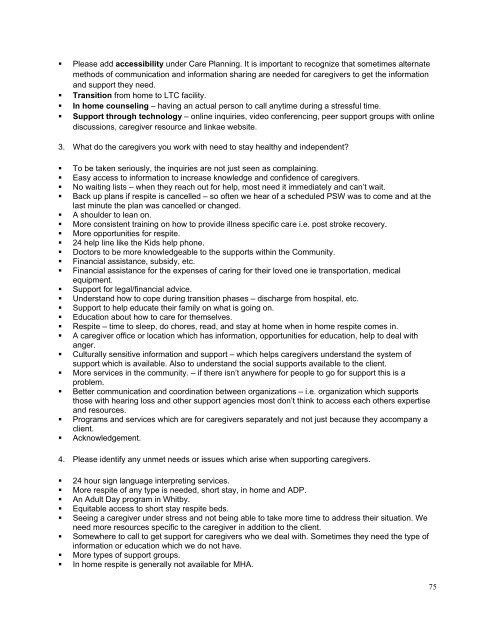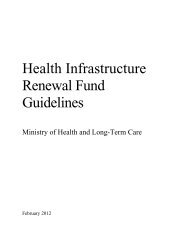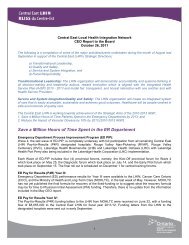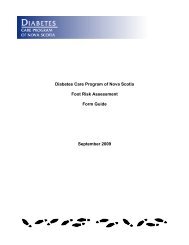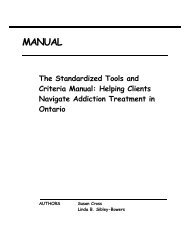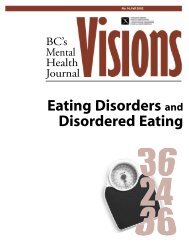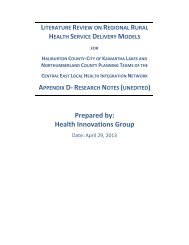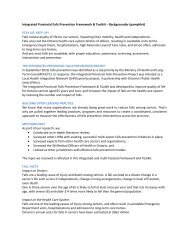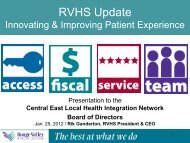Caregiver Support and Well-Being Priority Project - Central East ...
Caregiver Support and Well-Being Priority Project - Central East ...
Caregiver Support and Well-Being Priority Project - Central East ...
Create successful ePaper yourself
Turn your PDF publications into a flip-book with our unique Google optimized e-Paper software.
• Please add accessibility under Care Planning. It is important to recognize that sometimes alternatemethods of communication <strong>and</strong> information sharing are needed for caregivers to get the information<strong>and</strong> support they need.• Transition from home to LTC facility.• In home counseling – having an actual person to call anytime during a stressful time.• <strong>Support</strong> through technology – online inquiries, video conferencing, peer support groups with onlinediscussions, caregiver resource <strong>and</strong> linkae website.3. What do the caregivers you work with need to stay healthy <strong>and</strong> independent?• To be taken seriously, the inquiries are not just seen as complaining.• Easy access to information to increase knowledge <strong>and</strong> confidence of caregivers.• No waiting lists – when they reach out for help, most need it immediately <strong>and</strong> can’t wait.• Back up plans if respite is cancelled – so often we hear of a scheduled PSW was to come <strong>and</strong> at thelast minute the plan was cancelled or changed.• A shoulder to lean on.• More consistent training on how to provide illness specific care i.e. post stroke recovery.• More opportunities for respite.• 24 help line like the Kids help phone.• Doctors to be more knowledgeable to the supports within the Community.• Financial assistance, subsidy, etc.• Financial assistance for the expenses of caring for their loved one ie transportation, medicalequipment.• <strong>Support</strong> for legal/financial advice.• Underst<strong>and</strong> how to cope during transition phases – discharge from hospital, etc.• <strong>Support</strong> to help educate their family on what is going on.• Education about how to care for themselves.• Respite – time to sleep, do chores, read, <strong>and</strong> stay at home when in home respite comes in.• A caregiver office or location which has information, opportunities for education, help to deal withanger.• Culturally sensitive information <strong>and</strong> support – which helps caregivers underst<strong>and</strong> the system ofsupport which is available. Also to underst<strong>and</strong> the social supports available to the client.• More services in the community. – if there isn’t anywhere for people to go for support this is aproblem.• Better communication <strong>and</strong> coordination between organizations – i.e. organization which supportsthose with hearing loss <strong>and</strong> other support agencies most don’t think to access each others expertise<strong>and</strong> resources.• Programs <strong>and</strong> services which are for caregivers separately <strong>and</strong> not just because they accompany aclient.• Acknowledgement.4. Please identify any unmet needs or issues which arise when supporting caregivers.• 24 hour sign language interpreting services.• More respite of any type is needed, short stay, in home <strong>and</strong> ADP.• An Adult Day program in Whitby.• Equitable access to short stay respite beds.• Seeing a caregiver under stress <strong>and</strong> not being able to take more time to address their situation. Weneed more resources specific to the caregiver in addition to the client.• Somewhere to call to get support for caregivers who we deal with. Sometimes they need the type ofinformation or education which we do not have.• More types of support groups.• In home respite is generally not available for MHA.75


